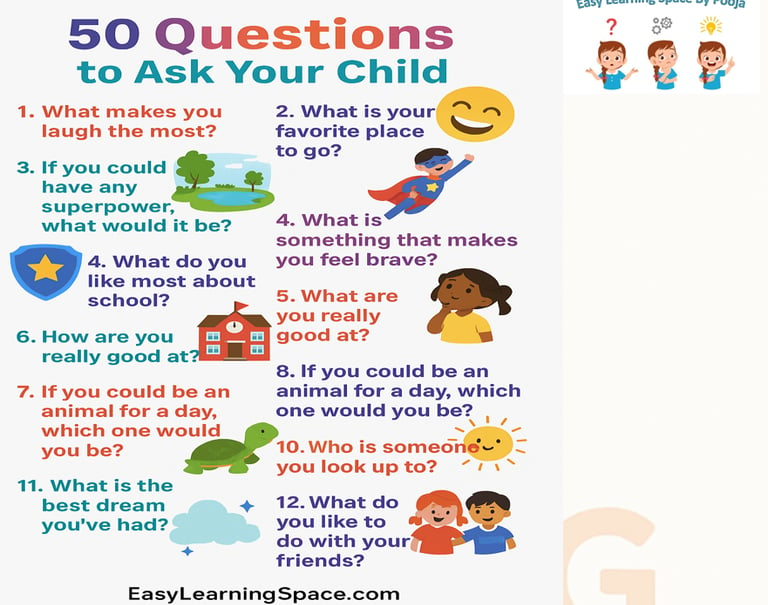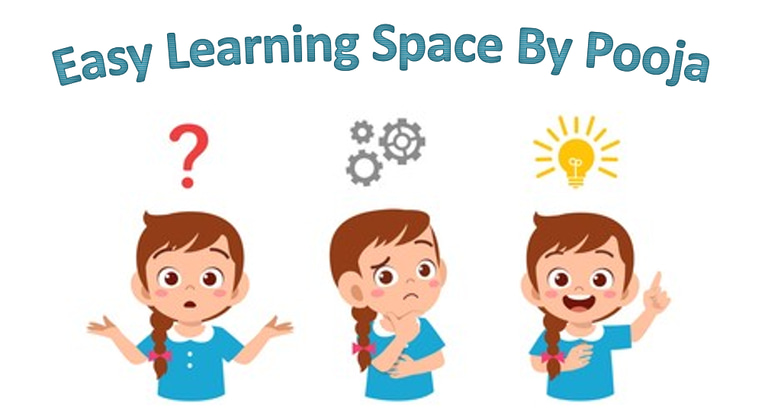50 questions to ask your child to understand and connect with them deeply
Powerful Questions to Build Your Child’s Emotional Intelligence, Questions Every Parent Should Ask Their Child Regularly, Must-Ask Questions to Connect Deeply with Your Child, Age-Wise Questions to Ask Kids: Toddlers to Teens
Pooja
7/31/20256 min read
Do we really know what is our child thinking?
My son was 10 years old when he told me " Mom, I never knew you were so funny". I felt overwhelmed in that moment. Why did my son not notice this before? Do I truly know him? Do I show the nature side of me, or I am just being "Mom" with him. I completely changed my perspective that day.
As parents, we all want to truly know our children — what they dream about, what worries them, what makes them feel safe and loved. But between busy routines, school runs, and screens, meaningful conversations can easily get lost in the day-to-day rush.
The good news? Sometimes, all it takes is the right question to open a window into your child’s world.
Whether you’re raising a chatty preschooler, a curious primary schooler, or a quiet tween, asking thoughtful questions helps you connect on a deeper level. It builds trust, encourages honesty, and nurtures your child’s emotional intelligence — giving them the words to express what’s in their heart.
In this blog post, you’ll find 50 simple, age-appropriate questions you can ask your child — from toddlers to teens — to help them open up and share their thoughts and feelings with you. Use them at bedtime, during car rides, at the dinner table, or anytime you want to strengthen your bond.
So, grab a moment, pick a few questions, and get ready for conversations that bring you closer to your child — one honest answer at a time.
Why asking questions is important?
Builds emotional intelligence
Strengthens parent-child bond
Helps parents to spot early problems (stress, bullying, struggles)
Parents can reflect and retrospect
Exchange of information from both parent and the child helps the smoothen the journey of parenting.
Understand and Express Their Feelings
Children often don’t have the words for big feelings like anger, sadness, jealousy, or fear. Gentle questions help them name and share what’s going on inside — a vital step for healthy emotional development.Build Empathy and Kindness
When you ask questions about other people’s feelings (“How do you think your friend felt?”), your child learns to see the world through someone else’s eyes. This builds compassion — a skill they’ll carry into friendships and relationships for life.Develop Problem-Solving Skills
Talking through emotions helps kids figure out what to do when big feelings come up. For example: “What can you do when you’re angry?” helps them think about healthy ways to cope instead of reacting impulsively.Spot Issues Early
Regular conversations can reveal hidden worries — like bullying, loneliness, or low self-esteem — that children may not share on their own. By asking and listening without judgment, parents can support their kids before small problems become big ones.
I'm not sure if you know this, but usually children behave differently in their school and peer group, while they have a completely different behaviour at home. Sometimes as parents we cannot relate to the feedback given by the class teacher too. There is absolutely no problem in loving and trusting our children fully, but sometimes it helps if we have an open mind. That is when these question answer session with our children helps us immensely.
Now, coming to the next aspect, what makes a question "good" question.
Open ended question or Yes/No questions
Non-judgmental tone questions
Age-appropriate questions
Children must trust their parents completely before they start answering the questions. Hence maintaining a non-judgmental tone is very important. If the child is trusting you and sharing something that may not be the right thing they did, your reaction can make or break their confidence. Maintaining a calm, straight face even when you want to punch them is very important. (Sharing from a personal experience). Kindly ask children age-appropriate questions, else you will not be ready to process their answers.
Categorize your questions
To understand them deeply it is very important to not ask questions randomly. For better results classify your questions.
For example, about school, (What was the best part of your day at school? Is there anything at school that would make you go to school everyday? or You do not seem excited to go to school, is there any specific reason?)
About feelings: Can you tell me about a time when you really felt proud of yourself? Is there something you wish I understood better about you?
Fun and dreams: If I tell you to plan a perfect day, what would you do? What is something you want to learn new this year apart from your academics?
To make it simpler, I have divided some questions that can be asked to your kids according to their age.
Toddlers (1.5 – 3 years)
Keep it simple — focus on feelings, naming emotions, and basic choices.
Are you happy or sad right now?
Show me your happy face! Show me your sad face!
What makes you smile?
Who do you like to hug?
When you feel upset, what do you want? (hug, toy, mum)
What is your favourite thing to do with mama/papa?
When they are having a meltdown, hold your patience and later ask them what exactly they were feeling? Ask them to put a name on their emotion. (angry, sad, happy etc.)
Preschoolers (3 – 5 years)
Help them explain feelings and understand others.
What makes you feel brave?
What makes you feel scared?
How do you know when someone is sad?
What can you do if a friend is crying?
What’s your favourite thing to do when you’re happy?
If you feel angry, what can you do to feel better?
At this age, they are learning new words every day, they are framing sentences and speaking like they know the world. Observation is the key here. Keep a tab on their new words and from where they have picked them up. When I hear a five-year-old child using the F word and I have a mini heart attack right there. Do not react wildly to such situations, it will make children more defensive. Like I said, keep calm and try to get to the bottom of the matter. Create awareness among children on the appropriate usage of words. Mostly speak about the consequences when such type of words or the language could cause.
Primary School Children (6 – 10 years)
Explore friendships, empathy, and self-regulation.
What was the best thing that happened today?
Did anything make you feel upset or worried?
How can you help a friend who is feeling left out?
What do you do when you feel really angry?
Is it okay to feel sad sometimes? Why?
What do you wish people understood about you?
Middle School Children (11 – 14 years)
Deepen reflection, self-awareness, and coping skills.
When do you feel the most confident?
What’s something that stresses you out?
Who do you trust to talk to when you’re upset?
How do you calm yourself when you feel anxious?
Is there a time you helped a friend feel better?
What makes you feel loved and supported?
What do you wish parents knew about how you feel?
We need to have long discussion about the kind of more questions we need to ask our children as they grow up. I have tried to present an idea about the questions that can be asked. The above-mentioned questions can be elaborated depending upon the answers the child gives. Some questions can be detoured too.
The Big Picture
When parents make question time a regular habit — at bedtime, over dinner, or during car rides — they create a safe space for honest talks. Over time, these simple conversations grow your child’s emotional strength, build resilience, and teach them it’s okay to feel all kinds of emotions.
In short: The more you ask, the more they trust. And the more they trust, the more they share — even the things they can’t say out loud yet.
Tips for Parents
Listen with patience — don’t interrupt.
Don’t force answers — give your child time.
Praise their honesty — no question is silly.
Use bedtime, car rides, or meals for these chats.
Interesting part: I have bribed and requested my son to do a small Q and A with me for this blog, after some persuasion he has agreed. Hope you like the banter.
Also you will notice me shocked and reactive at some answers and immediately taking control of my reaction!! it is hilarious how me who will write 1000 words on the topic and do the same mistakes I am supposed to avoid. Lets face it, being parents in today's word is not easy and we would not trade it for anything else too!
After we finished the video, my son brought to my notice that if a single mom or dad are watching this video, certain questions will hurt them. My heart was melting faster than an ice-cream! Share your thoughts and views. DO share this blog if you feel could be useful. Waiting for your responses eagerly.
Lots of love
Pooja
How to Help Kids Focus on Studies in a Digital World | Easy Learning Space by Pooja
Understanding National Education Policy 2020 | Easy Learning Space by Pooja



Address
Pooja
Bangalore
Contacts
easylearningspacebypooja@gmail.com
Subscribe to our newsletter
This blog is for educational purpose only
All the information on this website – www.easylearningspace.com – is published in good faith and for general educational and informational purposes only. I aim to provide helpful teaching tips and resources, but I make no warranties about the completeness, reliability, and accuracy of this information.
Any action you take upon the information you find on this website is strictly at your own risk. I will not be liable for any losses
